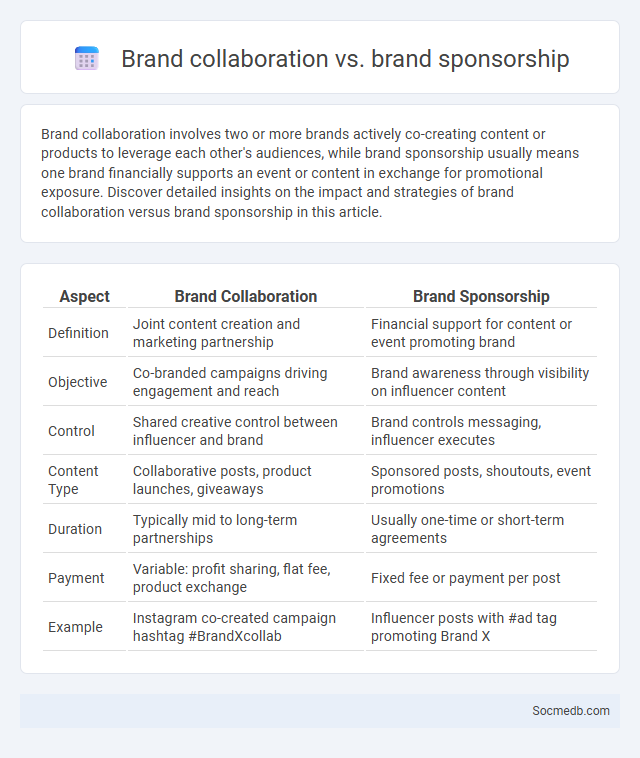
Photo illustration: Brand collaboration vs brand sponsorship
Brand collaboration involves two or more brands actively co-creating content or products to leverage each other's audiences, while brand sponsorship usually means one brand financially supports an event or content in exchange for promotional exposure. Discover detailed insights on the impact and strategies of brand collaboration versus brand sponsorship in this article.
Table of Comparison
| Aspect | Brand Collaboration | Brand Sponsorship |
|---|---|---|
| Definition | Joint content creation and marketing partnership | Financial support for content or event promoting brand |
| Objective | Co-branded campaigns driving engagement and reach | Brand awareness through visibility on influencer content |
| Control | Shared creative control between influencer and brand | Brand controls messaging, influencer executes |
| Content Type | Collaborative posts, product launches, giveaways | Sponsored posts, shoutouts, event promotions |
| Duration | Typically mid to long-term partnerships | Usually one-time or short-term agreements |
| Payment | Variable: profit sharing, flat fee, product exchange | Fixed fee or payment per post |
| Example | Instagram co-created campaign hashtag #BrandXcollab | Influencer posts with #ad tag promoting Brand X |
Understanding Brand Collaboration: Definition and Key Features
Brand collaboration in social media involves strategic partnerships between businesses or influencers to amplify reach and engagement. Key features include mutual brand alignment, shared content creation, and targeted audience engagement to enhance credibility and visibility. Effective collaborations leverage social media algorithms by combining audiences and authentic storytelling to drive organic growth and conversions.
What is Brand Sponsorship? Core Characteristics Explained
Brand sponsorship involves a company providing financial support or resources to an event, individual, or organization in exchange for brand exposure and marketing opportunities. Core characteristics include mutual benefit, where the sponsor gains visibility and brand credibility while the sponsored party receives funding or support. Effective brand sponsorship leverages audience alignment, measurable impact, and consistent brand messaging to enhance recognition and customer loyalty.
Brand Partnerships: Meaning and Strategic Importance
Brand partnerships on social media involve collaborative agreements between brands and influencers or other companies to leverage shared audiences and enhance brand visibility. These partnerships strategically boost engagement, increase reach, and foster authentic connections with target demographics, driving higher conversion rates. Utilizing data-driven insights to identify complementary brands ensures maximized impact and aligns marketing efforts with audience preferences.
Brand Collaboration vs Brand Sponsorship: Core Differences
Brand collaboration involves two or more brands working together to create joint content or products, emphasizing mutual creativity and audience engagement. Brand sponsorship typically features one brand financially supporting an event, influencer, or content, aiming for brand visibility and association without direct content co-creation. Collaboration fosters deeper integration and co-marketing opportunities, while sponsorship focuses on promotional reach and brand alignment.
Brand Partnership vs Brand Collaboration: Distinctive Elements
Brand partnerships typically involve long-term agreements where companies co-create marketing campaigns and share resources to achieve mutual goals, emphasizing strategic alignment and extensive brand integration. Brand collaborations often refer to shorter-term projects or limited-edition products that leverage each other's audience and creativity to generate buzz and drive sales. Key elements distinguishing partnerships from collaborations include contract duration, depth of involvement, and shared brand objectives.
Sponsorship vs Partnership: How They Differ in Marketing
Sponsorship in social media marketing typically involves a brand financially supporting an influencer or event in exchange for promotional exposure, emphasizing short-term visibility and brand awareness. Partnership, however, denotes a deeper collaboration where both brand and influencer co-create content or campaigns, fostering long-term engagement and authentic audience connection. Understanding these differences helps marketers allocate resources effectively to achieve targeted goals such as reach, engagement, or brand loyalty.
Benefits of Brand Collaboration for Businesses
Brand collaboration on social media significantly enhances business visibility by leveraging combined audiences and increasing reach exponentially. It fosters authentic content creation that boosts trust and engagement through genuine partner endorsements. Collaborative campaigns also drive cost-effective marketing strategies, resulting in higher conversion rates and strengthened brand equity.
Advantages of Brand Sponsorship in Growing Brand Visibility
Brand sponsorship leverages the extensive reach of popular social media platforms, enhancing brand visibility through targeted influencer partnerships and sponsored content. This strategy boosts audience engagement by aligning the brand with trusted figures, increasing brand recognition and loyalty. Sponsored campaigns on platforms like Instagram and TikTok generate measurable increases in impressions and follower growth, driving higher conversion rates and expanding market presence.
Unlocking Success: Pros of Strategic Brand Partnerships
Strategic brand partnerships on social media amplify reach by combining audiences for increased brand visibility and engagement. Collaborative campaigns leverage diverse content strategies and user-generated content to enhance authenticity and trust. Data-driven insights from partnered efforts enable precise targeting, driving higher conversion rates and long-term loyalty.
Choosing the Right Approach: Collaboration, Sponsorship, or Partnership?
Choosing the right approach for your social media strategy depends on your brand goals, target audience, and budget. Collaboration involves co-creating content with influencers for authentic engagement, sponsorship offers financial support in exchange for promotional opportunities, while partnerships establish long-term relationships with shared objectives and resources. Evaluating your business objectives and audience preferences helps you determine whether collaboration, sponsorship, or partnership will maximize your social media impact and ROI.
 socmedb.com
socmedb.com